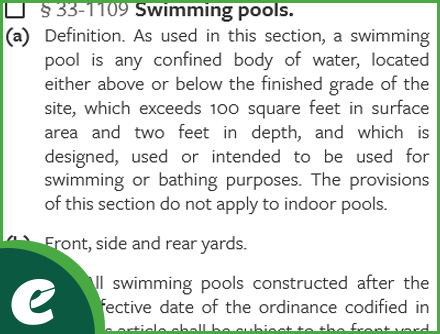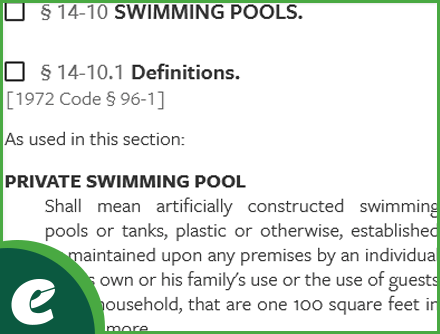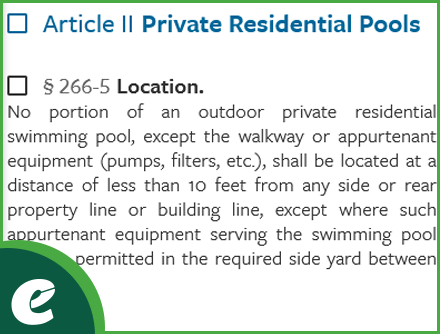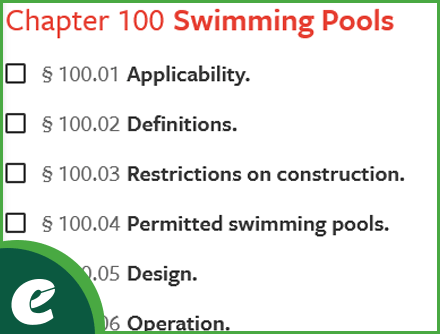With warm summer weather on the way, backyard swimming pools will soon be gathering places to enjoy a cool dip to beat the heat. Whether you own a pool or enjoy someone else’s, the summer season is always a good time brush up on pool safety and the rules and regulations everyone must follow. As enjoyable as backyard swimming can be, not following safety standards such as adequate, secure fencing, proper flotation devices and supervision can result in unnecessary injury or even death for swimmers of all ages.
View sample swimming pool legislation >
Eye-opening statistics
According to statistics from the water safety organization Stop Drowning Now, the United States averages 3,500 to 4,000 drownings annually. That’s an average of 10 fatal drownings per day. Eighty-seven percent of those drowning fatalities happen in home pools or hot tubs for children younger than five years old. And 23% of child drownings happen during a family gathering near a pool. It’s estimated that for every fatal drowning victim, another five to ten people receive hospital care for nonfatal drowning injuries.
A safe pool area can save lives
If you’re a pool owner or someone who’s in charge of a pool area, it’s essential for you to understand the pool laws and rules in your area so you know how to protect anyone under your watch from experiencing a pool-related injury.
At a minimum, your pool or spa must comply with all applicable federal, state, and local laws, ordinances, rules, and regulations. In most cases, a pool or spa or the area where it is located must:
- Be completely surrounded by an intact fence or barrier at least 48 inches high;
- Have gates that are self-closing and self-latching;
- Have one or more pool alarms, door alarms and/or gate alarms;
- Have anti-entrapment drain covers that are compliant with the Pool and Spa Safety Act, and any applicable local law, ordinance, rule or regulation;
- Have a certified safety floatation ring(s) readily available.
Because swimming pool safety laws can vary locally and by state, it’s necessary to understand each level to ensure that all laws are being followed. A great place to start is by reading the Safety Barrier Guidelines for Residential Pools document created by the Consumer Product Safety Commission. A list of pool safety laws by state can also be found here. Another good resource is the Pool & Hot Tub Alliance (PHTA) to find American National Standards developed with the International Code Councilon the various aspects of public and residential swimming pools, spas, and hot tubs.
Set usage rules for your pool
No matter what type of backyard pool or spa you own, establishing strict rules that every user of your pool must follow is essential and can help make swimming safe and fun for all.
- Never allow anyone who can’t swim in the pool without close supervision: If non-swimmers are in the water, be sure they are within arms-reach of a swimmer and wearing a Coast Guard-approved jacket that fits snugly.
- Assign a water watcher: During a gathering, plenty of adults may be around. But not everyone may be watching the pool. It’s important to assign an adult to watch children around the pool and enforce safety guidelines.
- No diving: Although enjoyable, diving can be dangerous. Only dive into pools that are considered “diving pools” or that have a designated deep “diving area.” Many backyard swimming pools are not deep enough to allow for safe diving.
- No roughhousing: Kids can get easily carried away with games or competitions. Discourage those that can get physical or endanger the safety of others.
- Avoid alcohol: Alcohol slows reaction time and affects balance and judgment, so avoid drinking alcohol if you are going to be swimming.
- Collect all toys: It is important to be cognizant of what toys and floats you leave in and around the pool, as well as any climbing device that can be used to access the water. Some may attract and avail young children to the water.
- Plan for emergencies: Have an emergency plan that includes CPR training. Learn how to turn off the pool or spa pump should a suction entrapment occur, and where to immediately find rescue equipment, including a long-handled hook or a buoy or flotation device with an attached line. Have a phone with you, whenever possible, so if there is an emergency you can quickly dial 911.
Useful examples of swimming pool legislation from the eCode360® Library
If your community is interested in enacting swimming pool legislation, here are some useful examples that can be found in our eCode360 Library:
Updating your municipal code is vitally important
Did you know you can set up a regular update schedule, so you don’t have to worry about compiling materials or taking up time and resources of your staff to do the updates yourself? As your municipality passes legislation, send it to General Code and we’ll take care of the rest. It’s just that simple!
For tips that will allow us to process your code updates most efficiently, click here.
Questions about updating your code?
Our Client Care team is available to explain the options and benefits of scheduled code updates or any other code-related questions you might have.
Sources:
- Stop Drowning Now
- Pool Safety Foundation: Swimming Pool Laws and Rules
- New York Department of State: Pools Safety Information
- USA Today: Drownings peak in the summer. What experts say about pool safety—and how to keep your child safe.
- StatisticsER: Drowning statistics for 2023
- The American Red Cross: Swimming Safety
- Swimming Pool Codes and Regulations Guide






